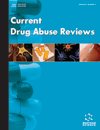-
oa Editorial [ The Importance of Raising the Profile of Alcohol Hangover Research ]
- Source: Current Drug Abuse Reviews, Volume 3, Issue 2, Jun 2010, p. 64 - 67
-
- 01 Jun 2010
Abstract
This special issue of Current Drug Abuse Reviews is devoted to the alcohol hangover. Alcohol hangover can be described as the general misery felt the day after an evening of excessive alcohol consumption. Among students and young adults, alcohol hangover is reported as most frequently experienced alcohol-related consequence [1, 2]. However, alcohol hangovers are experienced by people of all ages and the consequences are often underestimated. Three examples below illustrate the impact alcohol hangover can have on job performance, health, and accident risk. First, alcohol hangovers have serious socioeconomic consequences. In a recent Norwegian study, 526 employees were interviewed about how alcohol and drug use may affected their workplace safety and productivity [3]. Absenteeism due to alcohol use (at least once during the past year) was reported by 6.2% of the employees, whereas 24.3% reported having a hangover at work. Absence, inefficiency and reduced productivity because of alcohol hangover was much more often reported than other substance abuse problems such as the use of illegal drugs (0.6%). About 25% of the interviewed sample was working in the transportation industry. This is of concern, since driving a car is a potentially dangerous activity which is likely to be impaired during alcohol hangover [4]. Hangovers were significantly more often reported by male employees younger than 35 years old. The latter was also found in a survey among 13.582 Australian workers [5]. This study further showed that high risk drinkers (i.e. over 5 and 7 alcoholic drinks per day for women and men, respectively) were more that 22 times more likely to be absent from work due to alcohol consumption. Second, having alcohol hangovers frequently is also an important health risk factor. For example, Kauhanen and coworkers [6] examined the relationship between hangover frequency and cardiovascular mortality in a Finnish sample. Men that reported having an alcohol hangover at least once a month had a 2.36-fold increased risk of cardiovascular death when compared to those with less frequent hangovers. These results were found after correcting for age and total alcohol consumption. Third, increased accident risk is common during hangover. This has also been reported in sports. Cherpitel et al. [7] compared alcohol consumption patterns of 389 injured skiers with 899 non-injured skiers. Injured skiers reported much more often (61%) having been drinking over the past 24 hours than uninjured skiers (19%). Most injured skiers reported not having their accident during intoxication, but more than 12 hours after their last drink, suggesting that hangover effects may have been involved in producing the accident. While many more examples can be given, the alcohol hangover has, to date, received surprisingly little scientific attention. This is in sharp contrast to other less common medical complaints and the high prevalence of alcohol hangover among the general public. Table 1 illustrates this discrepancy by comparing GOOGLE hits with PUBMED citations. Fig. (1) gives an overview of PUBMED citations over the past 60 years when searching for “alcohol” and “alcohol hangover”. It is evident from Fig. (1) that, although most alcohol researchers have been active in other research areas, the popularity of alcohol hangover research is on the increase. In 2009 alcohol hangover researchers from around the world united under the auspices of the Alcohol Hangover Research Group (AHRG). The goal of the AHRG is to achieve consensus on current research methodology, as well as instigating new research collaboration with the aim to elucidate the causes and consequences of the alcohol hangover, and develop effective hangover cures (Fig. 2). A website was launched (www.alcoholhangover.com) to raise the profile of alcohol hangover research. A research symposium and consensus meeting was organized by Dr. Stephens and Dr. Verster as a Satellite Meeting of the 33rd annual scientific meeting of the Research Society on Alcoholism, 26th June 2010 (see Fig. 3). Dr. Joris Verster of Utrecht University in the Netherlands kicked off the symposium with a scene setting presentation discussing the causes and consequences of the alcohol hangover. Dr. Verster pointed out that although hangover was the most prevalent and commonly recognized problem experienced in relation to alcohol, only some 400 alcohol hangover research papers had been published to date, compared with over 650,000 research papers dedicated to other aspects of alcohol consumption. As a result of the lack of scientific interest, much remains to be investigated to reveal the pathology of alcohol hangover and develop effective hangover cures.......


